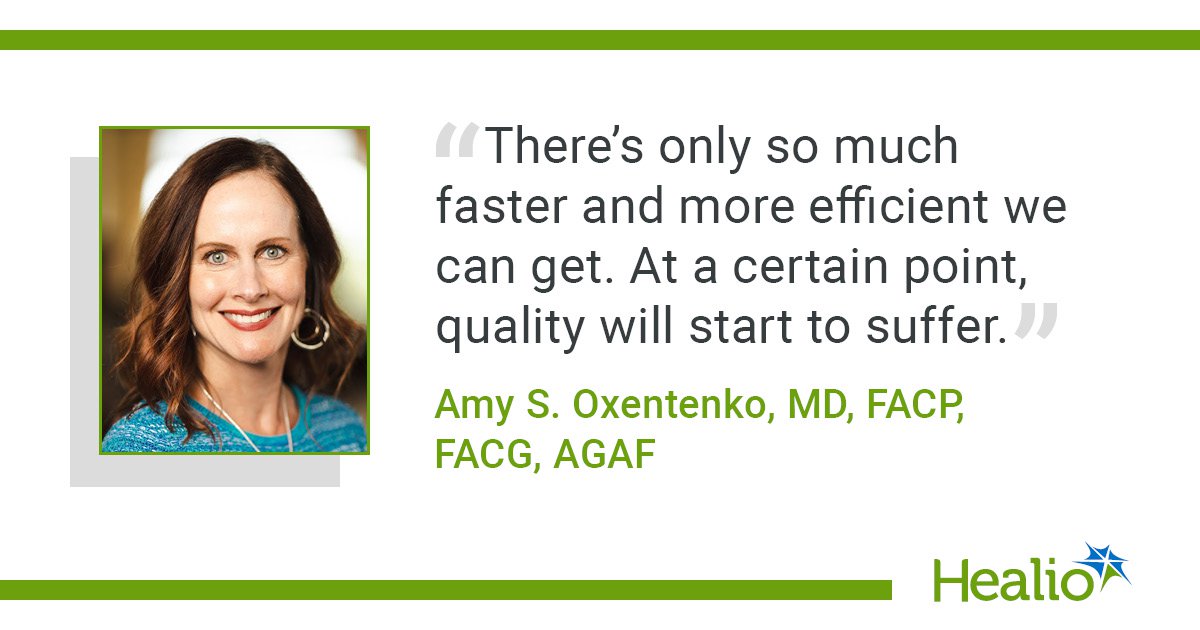August 05, 2025
5 min read
Key takeaways:
- CMS’ proposed “efficiency adjustment” of –2.5% — made every 3 years — would be applied to work RVUs for GI procedures.
- ACG believes this sends a “mixed message” focused more on speed than quality.
ACG has voiced concerns about CMS’ proposed payment rates for physician services in 2026, which includes an “efficiency adjustment” of –2.5% applied to payments for gastrointestinal procedures such as colonoscopies.
These cuts would be made every 3 years, according to ACG.

Additionally, CMS has proposed changes to the way physician practice expenses are calculated for office-based vs. hospital settings, likely leading to reduced payments for those working primarily in hospitals.
According to ACG President Amy Oxentenko, MD, FACP, FACG, AGAF, professor of medicine and vice dean of practice at Mayo Clinic, the efficiency adjustments are particularly concerning and will mean reduced compensation for proceduralists, including those in gastroenterology.
“We feel it’s sending a mixed message,” Oxentenko told Healio. “We’ve been so focused on value-based care in recent years, and now it’s pivoting toward speed and quantity. We believe it sends the wrong message in health care, where quality is so important, especially in a procedural specialty like screening colonoscopy.”
Healio spoke with Oxentenko about the proposed fee schedule’s potential impact and discussed how gastroenterologists — and patients — can take action to ensure procedure quality standards are maintained.
Healio: What are your thoughts on CMS’ physician payment proposal?
Oxentenko: Depending on a person’s type of practice, this proposal might feel neutral or even seem beneficial for some providers. The one thing that is most concerning for us is this efficiency piece. This is an area that gastroenterologists, but also any procedural or surgical practitioners, should be attentive to. It proposes cutting most physician work payments by 2.5% every 3 years.
I suspect that when this concept was put into place, the group who conceived it was assuming that as you do any technical skill or procedural activity, you become more efficient in it. With repetition, we all gain expertise and efficiency in these hands-on tasks.
Healio: Why is this logic potentially faulty?
Oxentenko: In the first few years of someone’s career, they are up-skilling and learning how to be more efficient in their practice, so there might be some linearity to that improved efficiency. However, that will plateau.
Imagine getting this message about an efficiency tax every 3 years over the course of a 30-year career. Based on this proposal, this means you’re going to be paid less every 3 years because of that efficiency.
There’s only so much faster and more efficient we can get. At a certain point, quality will start to suffer. Early on in your career, you may get more savvy at inserting the scope more quickly. However, our guidelines recommend a minimum withdrawal time of at least 6 minutes, ideally 9 minutes, as a quality metric in colonoscopy, given we know there is improved adenoma detection.
That means we should not have a goal to get faster on the way out, as we know that it will come at the cost of performing a high-quality exam.
Healio: What are the potential harms of prioritizing efficiency in this way?
Oxentenko: The part we need to shed a light on is that we don’t want to encourage efficiency on the way out. We hold gastroenterologists to a quality standard about minimum withdrawal times. If CMS tells people they’re going to be reimbursed less because they’re more efficient, is the agency incentivizing them to do faster procedures because they’re being reimbursed less per procedure? If so, might quality suffer? Will gastroenterologists be rushed, see fewer adenomas and take less time to clean, wash and really inspect?
Another concern is that we’ve been developing lots of great AI tools to help with procedures, as they can provide an additional set of “eyes” to allow us to see more polyps we may have otherwise missed. I worry that there could be misinformation around the idea that the use of AI is making us more efficient and quicker with our procedures.
AI is probably adding time to our procedures because it’s drawing our eyes to additional areas we might have missed and revealing more polyps, which must then be removed. These tools are making the quality of what we’re doing even better. However, that additional quality means additional time.
Healio: What is ACG’s stance on this?
Oxentenko: We’ve tried to be vocal about it, and to say, “Let’s cast a light on this and make sure CMS understands what they’re implying and what may be the unintended consequences.” GI practices will have to add more procedures, because they’re getting paid less due to the “efficiency adjustment,” most impacting those practices with the most experienced endoscopists.
We also want the agency to understand our concerns that by decreasing reimbursement based on efficiency, they may be incentivizing speed over quality. We are concerned this will cause proceduralists to go against our stated guidelines because of a perverse disincentive that isn’t evidence-based or quality-based.
That’s the message that needs to be emphasized in a way that will hopefully reach the administration. We want to remind them that they wouldn’t want to have their colonoscopies done by someone who is more worried about how fast they’re going rather than doing a thorough, quality exam.
Healio: What can our readers do to reinforce ACG’s position?
Oxentenko: We should make patients aware that we do have quality indices in colonoscopy, in terms of adenoma detection rate and minimal scope withdrawal time.
We want to make sure patients are aware that those are important. We want to remember the voice of the patient in all this and encourage them to raise their voices to Medicare and say, “Wait a minute. I don’t want to go to someone just because they’re fast. That’s not important to me. I want someone who is good and will provide a high-quality exam.”
Healio: Is there anything else you’d like to emphasize?
Oxentenko: We have focused so much on quality in recent years, and we don’t want to just start focusing on numbers and speed. That’s not how we’ve been trained in health care. This isn’t a factory where we’re not concerned about quality output.
This is where we need to lean in. We need physicians to work with policy makers and give examples of the negative impact this could have on our patients. ACG, AGA and ASGE recently called on members in an action alert to contact CMS directly to voice their concerns. We really need to dial that up and raise our voices, because it’s hard to ignore the voice of reason in providing quality health care.
Reference:
For more information:
Amy S. Oxentenko, MD, FACP, FACG, AGAF, can be reached at oxentenko.amy@mayo.edu.










